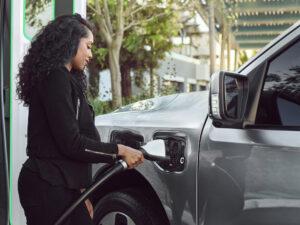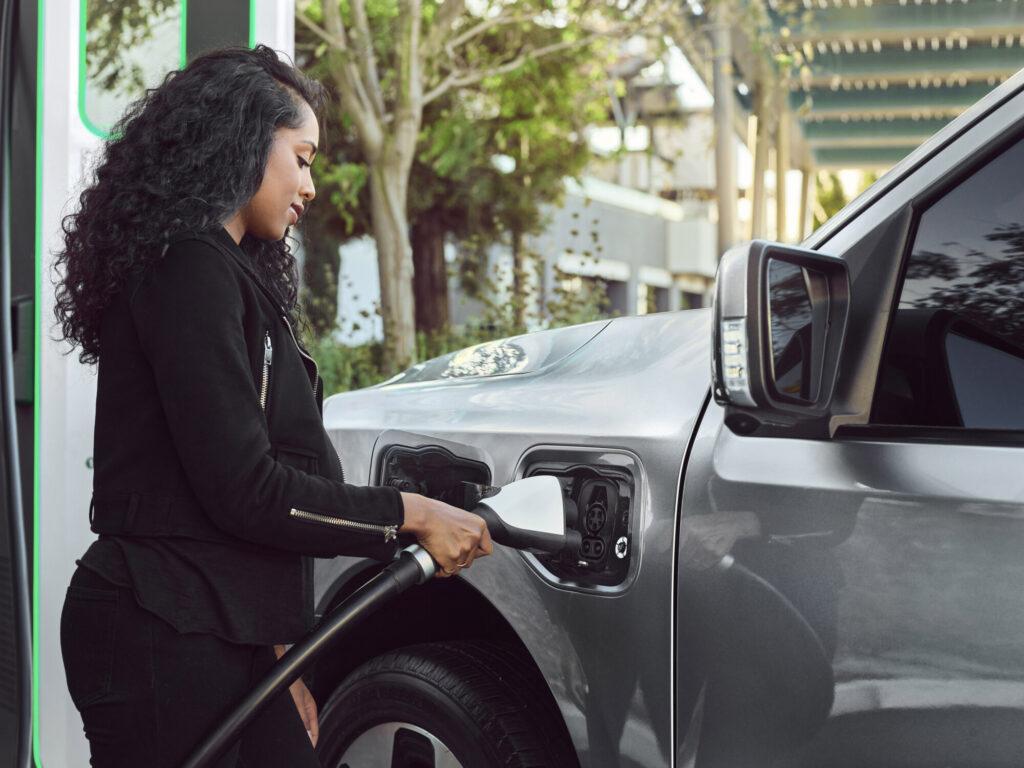
- Nieuwe gegevens tonen aan dat Ford op schema ligt om uiterlijk in 2050 CO2-neutraliteit te bereiken in alle voertuigen, het fabricageproces en de toeleveringsketen. Naar schatting vermindert de CO2-uitstoot van Ford EV’s tijdens de levensduur met maar liefst 60 procent in vergelijking met een vergelijkbaar voertuig met verbrandingsmotor
- Van 2017 tot 2022 heeft Ford de uitstoot van zijn productiefaciliteiten met 40 procent verminderd; in 2022 was 60 procent van de elektriciteit die het bedrijf gebruikte koolstofvrij
- Ford heeft 30 leveranciersaudits uitgevoerd bij toeleveringsketens voor minerale batterijen op alle niveaus tot aan de mijnlocatie, en heeft zijn nikkel-, lithium- en kobalt zorgvuldig gecontroleerd met beheersystemen
- Wereldwijd lanceert Ford ‘Road to Better’. In Europa lanceert Ford speciale Road to Better-websites om duurzaamheidsgerelateerde initiatieven te delen en vooruitgang te tonen
Ford publiceerde recent zijn Integrated Sustainability and Financial Report 2023. Hierin wordt de voortgang van het bedrijf beschreven met betrekking tot de toezegging om een duurzamere, inclusievere en rechtvaardigere toekomst te creëren.
Voortbouwend op meer dan twee decennia van duurzaamheidsrapportage, deelt het rapport nieuwe gegevens waaruit blijkt dat Ford op schema ligt om in 2050 CO2-neutraliteit te bereiken in al zijn voertuigen, het fabricageproces en de toeleveringsketen. Het rapport benadrukt ook de voortgang van initiatieven die in lijn zijn met de toezegging van Ford om op verantwoorde wijze geproduceerde grondstoffen in te kopen en de toeleveringsketen voor elektrische voertuigen en batterijen transparanter te maken.
Lees het bericht hieronder verder in het Engels:
“We believe the long-term success of any business is inextricably linked with creating value for customers, employees and communities, while also caring for the planet,” said Executive Chair Bill Ford. “We are undertaking a massive transformation to lead the electric and connected era of transportation and are committed to being transparent about our progress and opportunities for improvement. We are excited and optimistic about the future and look forward to making carbon-neutral transportation a reality.”
“In 2022, we made a number of advancements toward carbon neutrality, including introducing new exciting EVs, upgrading our facilities, investing in carbon-free and renewable electricity, and using our purchasing power to help scale low-carbon materials,” said Cynthia Williams, Ford’s global director, sustainability, homologation and compliance. “We’re also creating new visibility and accountability for a global EV and battery supply chain that upholds our values. This is how we can help build a more sustainable, equitable and inclusive transportation future.”
On The Road to Better
The Road to Better is Ford’s commitment to building a more sustainable, inclusive and equitable transportation future, where every person is free to move and pursue their dreams. As the company celebrates its 120th anniversary this year, it recognises that Ford’s long-term success will depend on creating value for customers, employees and communities.
Ford is launching Road to Better websites in France, Germany, Italy, Spain, and the UK, with more markets to follow soon. These will highlight Ford initiatives designed to help build a more sustainable future and will demonstrate clearly our progress towards defined sustainability goals.
Leading the Electric Vehicle Revolution
Around the world, Ford is dedicating more than $50 billion from 2022 through 2026 to develop and manufacture electric vehicles and batteries. The company is on the path to reach its targeted annual production run rate of 600,000 EVs by late 2023 and more than 2 million by the end of 2026. By 2030, half of Ford’s global vehicle sales volume is expected to be electric.
The report outlines statistics on the impact of this strategy, including the carbon dioxide emissions savings of driving a Ford EV. Estimates show that depending on the model, driving a Ford EV could reduce lifetime carbon dioxide emissions by as much as 60 per cent when charged with U.S. grid-average electricity compared to driving a similar internal combustion engine vehicle. For the F-150® Lightning®, this carbon dioxide reduction over the vehicle’s lifespan is equivalent to the carbon dioxide saved by not using approximately 33,225 L of petrol. The F-150® Lightning® pickup quickly became America’s best-selling electric pickup when it began its first full month of dealer retail sales in June 2022.
Accelerating Progress to Carbon Neutrality
Beyond reducing tailpipe emissions from its vehicles, Ford’s commitment to carbon neutrality focuses on reducing emissions from the facilities, processes and electricity that support the company’s operations and global supply chain.
Ford reduced Scopes 1 and 2 emissions by 35.4 per cent since 2017, which accounts for direct emissions from its operations and indirect emissions from energy purchases. Ford invested more than $26 million in facility upgrades to improve energy efficiency and conservation across its facilities and manufacturing processes, helping the company achieve a 40 per cent reduction in absolute manufacturing greenhouse gas emissions from 2017. The company also made strides to transition to carbon-free electricity usage, incorporating 60.6 per cent carbon-free electricity into its operations globally, including all purchased electricity for manufacturing in Europe and Mexico. Globally, 42.6 per cent was renewable electricity.
Between 2019 and 2022, Ford additionally reduced its overall Scope 3 emissions, which include emissions from suppliers, products and other non-facility sources, by an estimated 23 per cent. Ford was the first American automaker to include its global supply chain on the Manufacture 2030 platform, inviting 3,000 Tier 1 supplier sites to participate in the program designed to help them measure, mitigate and reduce emissions. Ford plans to invite additional Tier 1 and indirect suppliers to participate in Manufacture 2030 in 2023.
Building a Responsible EV Supply Chain
Ford works to ensure that the company’s global supply chain protects the environment and human rights. As it builds a new EV and battery supply chain, the company is taking an important first step to secure raw materials directly from mining companies aligned with Ford’s corporate policy. The report details several new initiatives to increase transparency, traceability and due diligence.
In 2021, Ford initiated EV and battery supply chain mapping and auditing to better understand the origins of raw materials in its EV supply chain, including nickel, lithium, cobalt and graphite. To date, the project has conducted 30 supplier audits along these four critical mineral battery supply chains at all tiers to the mine site. In early 2023, along with its suppliers, the company also underwent an audit of its nickel, lithium and cobalt due diligence management systems. Building on that process, Ford strengthened its corporate practices, including introducing new environmental, social and governance requirements into its sourcing agreements.
Across its broader supply chain, Ford continues to work closely with its suppliers and with third-party assurers like the Initiative for Responsible Mining Assurance, Responsible Minerals Initiative and Responsible Business Alliance to identify and address environmental and human rights issues in its supply chain against comprehensive criteria outlined in the company’s Supplier Code of Conduct. In 2022, Ford trained 844 purchasing employees, 2,647 other Ford employees and 979 suppliers in supply chain sustainability topics, including anti-corruption, fair labour and environmental protection practices.
Helping Communities Thrive
The company’s philanthropic arm, Ford Motor Company Fund, partners with nonprofits and community leaders to help meet the unique needs of communities in more than 40 countries around the world. In 2022, Ford and Ford Fund made more than $64 million in charitable contributions, investing in partnerships and programming across three impact areas: unlocking access to essential goods and services; opening pathways to education for the future of work; and diversifying the pipeline of entrepreneurs.
As part of its commitment to increasing economic opportunities for women and addressing the root causes of child labour, Ford is supporting a pilot programme through the Ford Fund to promote responsible mineral sourcing and empower women working in the copper and cobalt supply chains in the Democratic Republic of Congo. In 2022, the project provided equipment, access to banking services and financial education for at least 50 women. More than 90 women working in artisanal cobalt sites benefitted from training in entrepreneurship, financial literacy, and environmental and social standards for artisanal and small-scale mining. Ford Fund has recently extended support and doubled its spending on the project into 2023.
The Integrated Sustainability and Financial Report provides transparency about the company’s progress towards reaching its sustainability goals and shows how it is moving forward on The Road to Better. To read the full report, and to learn more about The Road to Better, visit sustainability.ford.com.


